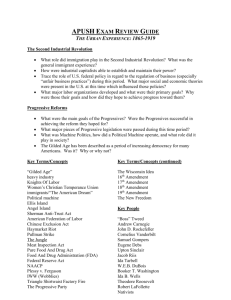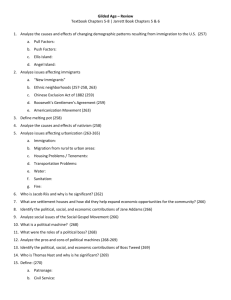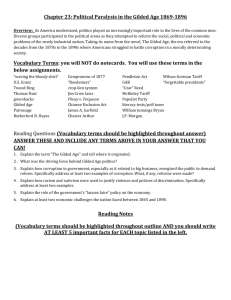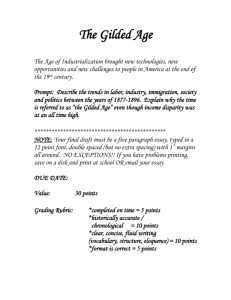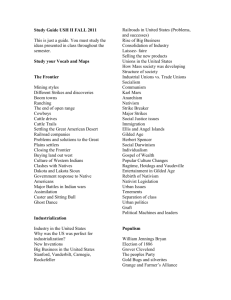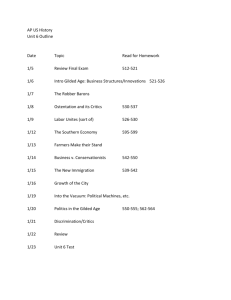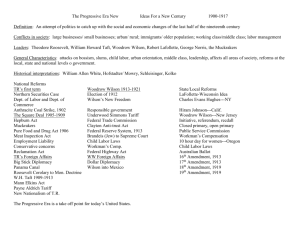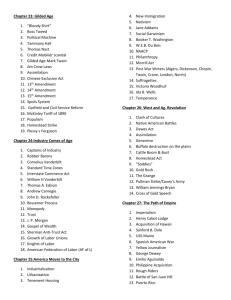The Gilded Age and Progressive Reforms - pams
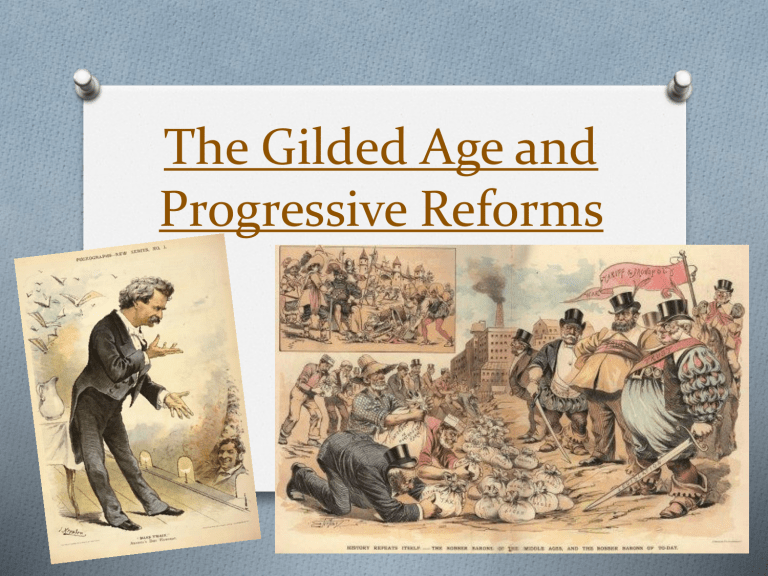
The Gilded Age and
Progressive Reforms
The Gilded Age, 1870s – 1890s
O
O
The term “gilded” means covered with a thin layer of gold paint. It is generally, however, a pejorative term – suggesting that there is a falseness beneath the surface.
During the “Gilded Age” American citizens suffered due to unfair business practices and corruption in government. And as a result, the glittering technological gains and accumulated wealth which characterized the lives of a handful of important businessmen were not shared by most citizens – most were quite poor.
The Major Concerns of the
Gilded Age in the America:
O Wealthy industrialists and major business leaders were engaged in unfair business practices which allowed them to enrich themselves at the expense of the public – while running competitors out of business.
O Corruption and dishonesty in government were rampant – bribery and voter fraud characterized many elections, and government leaders were self-interested.
The Assassination of
President James Garfield
President James
Garfield was murdered in 1881 by a disappointed office seeker named
Charles Guiteau. In response, the
United States
Congress passed the
Pendleton Act, a law which encouraged
Civil Service reform.
The Sherman Anti-Trust Act
O
O
O The law was intended to prevent unfair combinations of businesses – trusts or pools, for example – from using unfair methods to destroy their competitors.
The act was meant to protect consumers.
Unfortunately, judges willfully misinterpreted the law in several cases, claiming that the intention was to prevent labor unions from discouraging or disrupting free enterprise.
Thomas Nast, the political cartoonist:
“Who Stole the People’s Money?”
William
“
Boss” Tweed made it to jail eventually, but he was never truly condemned by the people he had robbed…
Progressive Voting Reforms
O The Primary System – Instead of allowing party leaders to pick their candidates, an election in which voters can choose their candidates is held.
O The Recall – a process by which people may vote to remove an elected official from office.
O The Initiative – a process that allows voters to put a bill before the state legislature – without sponsorship by any particular delegate or member.
O The Referendum – a way for the people to vote directly on a new law – or a tax increase.
The 16
th
Amendment
The 16 th Amendment created the graduated income tax, a method of collecting taxes based on the income of the individual citizen.
When courts ruled this unconstitutional, the Congress passed an amendment allowing it. Since taxes are collected at different rates – the poor paying a lower rate of taxation, the wealthy pay higher rates – it distributes the tax burden to those who benefit the most in society.
The 17
th
Amendment
The 17th Amendment to the
Constitution was another voter reform amendment– providing for the direct election of
Senators. Previously, Senators had been selected by State
Legislatures, meaning that the party in power could select their own leaders according to party politics. In Wisconsin, the voters continued to choose
Robert “Fightin’ Bob” La
Follette, largely for his anti-trust and anti-monopoly stances.
Voting reforms that empowered the people were characteristic of the Progressive Era.
Muckrakers
O
O
O
O
Theodore Roosevelt was trying to insult the journalists who went around exposing corruption and malpractice in society when he coined the phrase “muckraker.” He found these journalists bothersome.
Muckrakers kind of liked the sound of it, though!
Muckrakers were crusading journalists who attempted to expose problems in society and then encourage the people – and the people’s government
– to solve the problems.
Poverty, crime, living conditions, consumer safety, child labor, lynching, education, and economic exploitation were all addressed by muckrakers.
“There is no man more dangerous, in a position of power, than he who refuses to accept as a working truth…
… the idea that all a man does should make for righteous and soundness – that even the fixing of a tariff rate must be moral…
“When nothing seems to help, I go look at a stonecutter hammering away at his rock perhaps a hundred times without as much as a crack showing in it. Yet at the hundred and first blow it will split in two, and I know it was not that blow that did it, but all that had gone before.”
“I aimed for the public’s heart, and by accident, I hit it in the stomach.”
- Upton Sinclair , Socialist,
Novelist, Activist .
